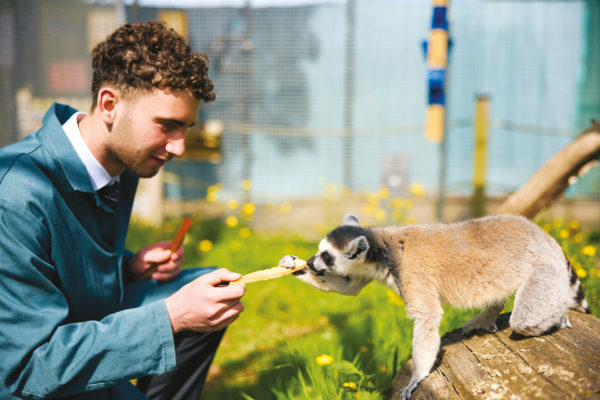Climate Change In The Classroom
By
1 year ago
Lessons on climate change are taking root in the classroom, says Peter Stanford
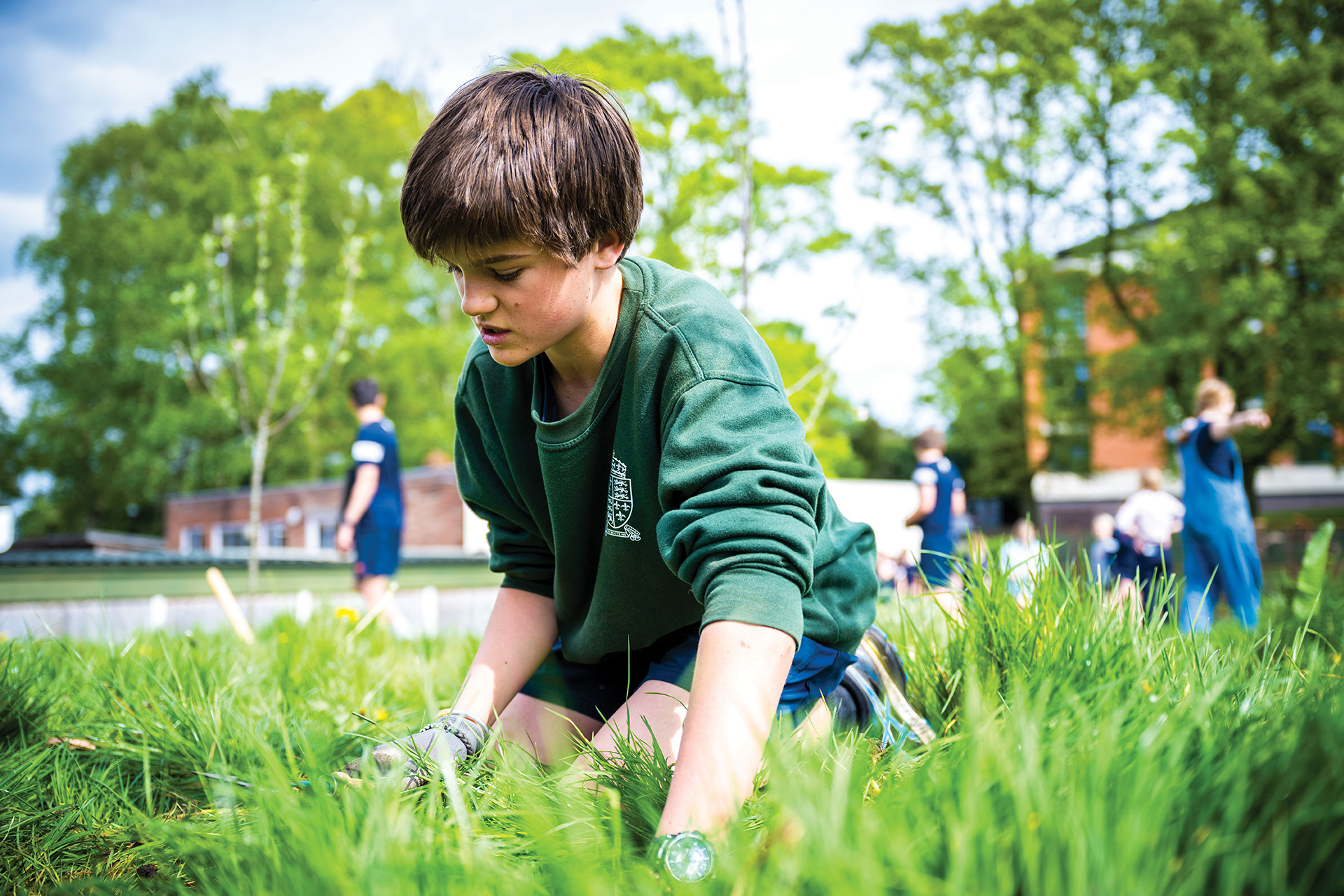
I wish that in the future there will be no end for animals,’ wrote one primary-age youngster on a sheet of paper as his contribution to a time capsule that his class were making. It was part of one of the workshops entitled ‘Hope’ run in schools across Devon by the organisation Planet and People. Another added her own design for a school building made only from recyclable material that would grow with each age-group as they got older. A third drew a graph of the carbon footprint made by humans that was full of aspiration. It registered ‘high’ in 2023 but ‘low’ in 2073.
Conservationist Jess Carter co-founded People and Planet in 2020 with geography teacher Bethia Stevenson-Paul as a positive way of responding to burgeoning levels of eco-anxiety among youngsters. ‘We wanted to find a creative way to address that anxiety and show them how they can be pro-active.’
In their ‘Speak Up’ workshop, one of a range mapped to the curriculum that they deliver around the south-west in schools that include Blundell’s in Tiverton, Kingsley in Bideford, and Stover on Dartmoor (and are now expanding into other areas of the country), attendees spend half-a-day learning about climate change and nature through a range of group activities that include quizzes and making a T-shirt with an environmental message on it.
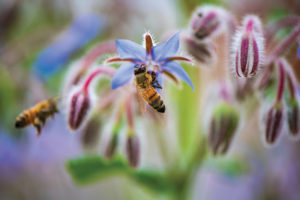
Bees in nature (Image: Pexels)
It is all part of a broader response in schools around the country to a recent spate of learned reports that has highlighted a rising tide of ‘eco-anxiety’ among young people. The Woodland Trust found one third of teenagers feeling ‘scared, sad or pessimistic’ about the challenge of climate change. The British Association for Counselling and Psychotherapy suggested two thirds of the same age group were suffering anxiety and a sense of powerlessness as global temperatures continue to rise. Another survey estimated that as many as a third of young people seek therapeutic or medical help because they are so worried by the future of the planet.
Some schools are opting to bring in outside organisations to help – such as the People and Planet workshops, or expert speakers from green charities at regular enrichment sessions. Many are also tackling it internally by creating sustainability programmes that cover all aspects of school life from curriculum to buildings, catering, greening – or better still doing away with – the school bus. At James Allen’s Girls’ School – usually abbreviated to JAGS – a day school for 4-18 year-olds in south east London, and the second oldest girls’ school in Britain, they appointed their first ever Sustainability Lead in January 2022 to help them achieve their goal of being carbon neutral by 2030. Priya Hira – in her first role in an educational setting, having previously worked on sustainability in industrial settings – explains that her main priority so far at JAGS has been ‘to listen to, engage and carry with me the various stakeholders at the school: students, parents, staff’.
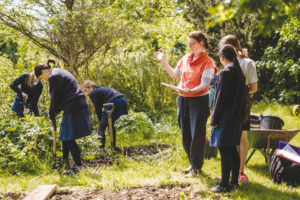
James Allen’s Girls’ School, London
All have been hugely receptive, she reports, and eager to play their part in delivering change: for its own sake, that of the planet, and to address climate anxieties in the younger generation. Pupils in particular have been keen in setting her challenges. ‘Our student voice here is strong, so when I asked for ideas about reaching our carbon neutral goal, they delivered.’
The amount of food wasted at the school was, she reports, a big concern. Now all peelings produced in the school kitchen are turned into compost using a hard-operated, second-hand (aka recycled) gadget. ‘It is spread on our botany beds as mulch to reduce moisture loss. Our Year 7’s are taken to see it in action as part of their science lessons. We feel it is important for them to see a visual representation of what sustainability looks like’
And that same ethos has reached most parts of school life. Eco-champions have been appointed, and a ‘climate café’ established where the pupils provide sustainable snacks they have baked, and gather with teacher supervision to share their anxieties about climate change. There has also been a push around walking or using bicycles to come to school so as to cut the carbon footprint. Bicycle repair kits have been installed next to the bike racks around the site to encourage this.
‘Sometimes,’ says Hira, ‘it can be complicated because the solutions are not quite what the pupils expect them to be. Some of them raised the question of uniform, and whether the school jumpers should continue to be 100 percent acrylic.’
She took their concerns to the uniform suppliers who responded by coming back with an alternative that was 50 percent natural fibres. ‘The supplier came in and did a presentation that was very instructive because, in an ideal world, the jumpers would be made only of natural materials, but then they also need to be durable and acrylic makes them last longer, so we had settled on a blend.’
At Shrewsbury School, founded in 1552 and today with 840 co-ed boarding places, they have opted for a pupil-led Eco Committee, established in 2018 and now comprising 65 active members. ‘I am incredibly proud of their work,’ says Jackie Matthews, a biology teacher at the school, ‘and continue to guide them on how we can influence and bring about positive change within our school community to tackle the climate and nature crises by working with leaders, the grounds team, specialists, teachers and other pupils’.
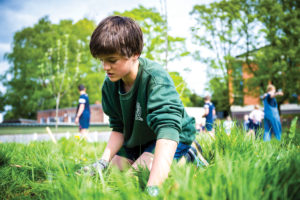
Shrewsbury School pupil gardening
It is all about getting everyone on board – and being practical. Doing things can be a good way of dispelling anxiety about climate change. This autumn, the Eco-Committee has sown a wild flower meadow, while their ‘passion project’ has been the design and establishment of a ‘Pollinators’ Garden’ to combat the decline in Britain’s bee population. It was opened recently by Professor Dave Goulson from Sussex University, who grew up in Shrewsbury and is now a world-renown expert in bee ecology.
Abingdon School, Oxfordshire, has also taken a pro-active approach to reducing food waste. The school uses an Ecobot food waste drier to manage their waste and reduce the output by 90 percent. This shredded waste can then be used to grow plants around the school site, reducing the environmental impact of food waste collection and boosting biodiversity.
That greater awareness of the threat posed by climate change has also had a growing influence on the curriculum in schools. At Francis Holland in London’s Sloane Square, a girls’ day school for four to 18-year olds, Andrew Macdonald-Brown has been combining his role as an English teacher with being the Sustainability Co-ordinator for the past three years.
‘One of the first things I did when I took on the role,’ he says, ‘was create a grid of priorities under three headings – curriculum, culture and what I called ‘the machine’ – the operation of the school including heating and lighting. Along with reducing the carbon footprint of the premises, and bringing in speakers as part of enrichment to share with pupils what is being achieved in combating climate change, I have been working with colleagues in different subject area to bring more references into what we teach in lessons.’
It works, he explains, in a whole variety of ways. ‘In Maths, we always try to use real-world problems when setting calculations, so now we include rising sea-levels among them. In geography, as the subject that arguably touches most on climate change, there is plenty of buy-in from teachers here. And even in my own subject, at A-level there is a unit we can choose in the English Literature curriculum where we look at novels that are about dystopias. Cormac McCarthy’s The Road is one example and allows us to discuss the scary eco-prospects that the pupils feel are hanging over us.’
He highlights another option in the curriculum around eco-criticism that encourages pupils to look at texts through the lens of ecology. ‘It is a different way of examining and talking about often familiar texts, such as Lord Of The Flies [by William Golding] which is often seen as a parable about colonialism, or good versus bad, but can also be read as about humanity exploiting the land they live on. We have had some really lively discussions.’
While much is clearly being achieved, the pressure to deliver more is being felt throughout the whole schools system. This summer a national teacher survey by University College London found that less than 13 percent of respondents reported a focus on climate change and sustainability being there in their Initial Teacher Education (ITE). Meanwhile, less than half (44.9 percent) said they had received formal professional development related to climate change and sustainability.
‘It takes time to change minds,’ reflects Priya Hira at JAGS, ‘but I have seen in my short time here how much can be achieved. The younger years are always engaged with climate change. They are like sponges. And the older ones too are keen to be more educated, more knowledgeable on the subject. That way they will go forward able as well as willing to play their part in the changes that we as a society are going to have to make.’
DIRT Charity
Working towards a climate solution
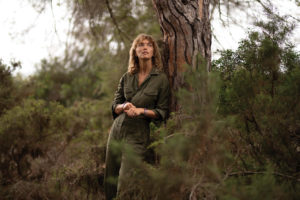
Arizona Muse, Founder of DIRT
Founded in 2021 by Climate Activist and Sustainability Consultant Arizona Muse, Dirt Charity works to use Biodynamic agriculure to find a long-term solution for climate change. This method offers a nature-based approach to farming, ensuring that crops are grown without harming the soil. The end-goal is to encourage the fashion industry to use a more sustainable method of growing fashion crops. dirt.charity





